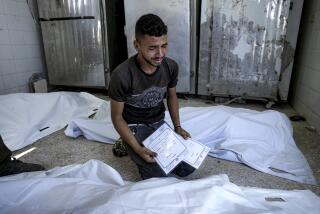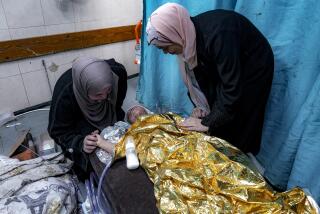Bosnia’s Orphans of Rape: Innocent Legacy of Hatred
ZAGREB, Croatia — Five-month-old Muhammed smiles at the caress of his day-shift nanny, exposing two little bottom teeth and an innocence of the horror that gave him life and the stigma that stalks his future.
Muhammed is one of the hundreds of infants born to Bosnian women who were raped, children of wartime atrocity who probably will never know a normal family life, especially as long as their country remains mired in deadly turmoil.
By Sarajevo government order, these youngest citizens of Bosnia-Herzegovina are growing up in institutions generously supplied by foreign charities with everything the babies need, with the exception of parents.
The Bosnian government has prohibited adoption of the children of rape in hopes that their natural mothers will someday learn to accept them or that the war will end soon and the rejected babies can be placed in other Bosnian homes.
But the decision to hold out for reunion of the mothers and spurned babies or the equally unlikely scenario of swift resolution of the savage Bosnian conflict has trapped the abandoned children in the middle of a passionate debate.
Those seeking to help the rape victims object to the subtle pressures being applied to the women to accept children who will always remind them of their violent impregnation. The Bosnian leadership, on the other hand, claims that 200,000 people have already been killed in 15 months of nationalist aggression, and it refuses to forsake any more of its endangered citizens.
Rejected by their mothers, unknown by their fathers and orphaned by the government policy that some see as tainted with nationalism, Muhammed and his institutional siblings face a future as permanent war victims and a lifetime of being marked as the result of rape.
“This is the most terrible thing the war has produced,” Aida Cicic, a Sarajevo pediatrician and a refugee herself, said of the ritualized rape that produced the five infants she helps care for at a Zagreb safehouse. “The mother of one boy was raped by 20 Chetniks (Serbian gunmen) at a time, not one day but for weeks and months, until her pregnancy was so far advanced she couldn’t terminate it. These women are not normal now and they cannot make decisions about their lives.”
Cicic and officials of the Egyptian Agency for Humanitarian Aid, which opened the children’s home three months ago, believe that some of the natural mothers may later realize their babies are innocent victims and choose to take them back.
“That is what would be best for the babies,” said the 30-year-old doctor who has two sons of her own. “In my opinion, adoption would be a good solution, but only after time, maybe two years, and only to Bosnian couples.”
None of the mothers has yet decided to reclaim her child. But Cicic said two have paid visits to the safehouse to see their offspring under encouragement of aid agency counselors.
A Muslim psychologist who assists rape victims and their children in the strife-torn city of Mostar insists that the babies must be brought up as citizens of Bosnia.
“My view is that for the children, it is better if they stay here in Bosnia-Herzegovina or at least in temporary shelter in Zagreb,” said Selimovic Harun. “I believe these women will eventually give the children up for adoption, but conditions in Bosnia-Herzegovina are not suitable for that now.”
Under a contract with the Bosnian government, the Egyptian agency has hired Cicic and nine other Bosnian women health care workers to look after the children conceived in rape and abandoned at birth in Zagreb hospitals. Five, including Muhammed, have already been settled at the two-story white villa where Cicic and her colleagues are compelled by their foreign sponsors to wear Muslim head scarves when men are present.
The Zagreb home, which expects to take in 20 infants within the next few months, is immaculate and well-supplied with cribs, toys and matrons, and all five of its current wards--three boys and two girls--appear content and well cared for.
But agency officials concede they know nothing of the fate of the majority of rape orphans placed in Bosnian group homes that have since been cut off by the raging conflict. They have no means of contacting centers that were being set up in Sarajevo, Zenica and Mostar, all three now inaccessible to foreign case workers or supply convoys.
Doctors, psychologists and social workers involved in counseling the rape victims further criticize the Bosnian government’s approach as likely to prolong the assaulted women’s agony to keep open an option few are expected to take.
They also object to housing the children of rape together in a separate institution, fearing that will mark them in the community and expose them to potential danger from other war victims sick with vengeance or grief.
“Not one of the women I spoke with, and I spoke with them for hours, had even a minimal wish to take their babies. We had to put blindfolds on them for the deliveries,” said Asim Kurjak, head of obstetrics and gynecology at Zagreb’s Holy Spirit Hospital. “The babies are innocent third parties, but I personally do not believe any of these women will ever change their minds. They tell me they don’t consider that these are their babies. They are like foreign objects to them.”
Kurjak told of one 17-year-old so consumed with shame and fear that she threatened to kill herself if the hospital staff made any record of her having given birth. For the benefit of her tradition-bound family, the teen-ager’s delivery after a rape-induced pregnancy was noted in her medical charts as surgery to remove a kidney stone.
“Many of these women made pregnant by rape are from very conservative societies,” said the prominent obstetrician, a native of Bosnia. “It is hard for me to imagine the idea that a daughter wouldn’t feel able to tell her own mother or sisters. They have tremendous fear that if the rape becomes known, they will never marry, or that they will be rejected by their husbands and fathers.”
Given the revulsion the rape victims show toward any reminder of their ordeal, Kurjak said he believes both mother and child would be better off if the women’s children were made available for foreign adoption. “Babies will accept any parents who love them,” the doctor said. “Unfortunately, at this time, there are much better possibilities abroad to provide such an atmosphere than anywhere in this troubled region.”
Kurjak emphasized that it was his personal belief that the children of Bosnia’s rape victims would be better off settled abroad. But Kurjak expressed some understanding of the Sarajevo government’s refusal to renounce responsibility for the abandoned infants who are Bosnian citizens.
Ahmed Zin, director of the Egyptian aid agency designated by the Sarajevo leadership to operate group homes for the rape orphans, explained that the Bosnian government considers itself responsible for all its citizens and would no more give up on caring for the children of rape than it would on Bosnia’s ill or aging.
He estimates that 500 to 600 children of rape have been born in the last few months; he speculates that many more are probably trapped with their mothers in the 70% of Bosnia now under Serbian control.
His agency and other foreign charities had been supplying sanctuaries for children of rape in central Bosnia. But Croat-Muslim fighting that escalated two months ago has blocked all access to the other homes, Zin said.
Besides the Sarajevo government’s desire to see that the abandoned children of rape victims remain citizens of Bosnia, it also fears provoking the kind of unscrupulous baby trade that resulted when Westerners learned of the plight of Romanian orphans more than three years ago.
Foreigners seeking Caucasian children flooded the country after the downfall of a Communist dictatorship that forbid abortion; they paid impoverished women to give up their babies and bribed officials to provide adoption papers.
Kurjak said he had already received numerous letters from desperate childless couples seeking to adopt, including one from a wealthy Cairo family who offered to build a new wing for his hospital in reward for being favored with a Bosnian newborn.
“The government is concerned it could be accused of selling its children, as happened in Romania,” Kurjak said.
Those working with the rape victims, however, contend that is a risk the government will have to take.
“Our policy would be to support the mother, whatever her decision. But I think the best solution would be to allow adoption abroad,” said Vesna Kesic, head of the Zagreb Center for Women Victims of War. “These children would have a horrible destiny here. They would always be known among some people as the ‘Little Chetniks.’ ”
Branka Herljevic, a Sarajevo lawyer-refugee who counsels rape victims, agrees there is slim likelihood the mothers will ever want to raise their rejected children and questions her government’s motives in holding out that option at the babies’ expense.
“It could be a state strategy to maintain the population which strikes me as a kind of nationalism,” she said.
Bosnian President Alija Izetbegovic contends 200,000 Bosnians have been killed in the war and 2 million others--nearly half the republic’s population--have been displaced by fighting or the nationalist practice of “ethnic cleansing.”
As one senior Bosnian government official explained the policy to Kurjak, the Sarajevo leadership fears giving up hundreds of its youngest citizens would further the nationalist quest to erase the state of Bosnia from Europe’s map.
More to Read
Sign up for Essential California
The most important California stories and recommendations in your inbox every morning.
You may occasionally receive promotional content from the Los Angeles Times.











